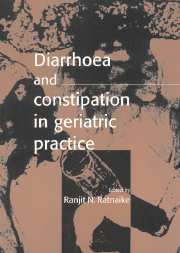Book contents
- Frontmatter
- Contents
- List of contributors
- Preface
- Acknowledgments
- Foreword by Gary R. Andrews
- I Defences of the aging gastrointestinal tract
- II Diarrhoea
- III Noninfectious clinical entities
- IV Constipation
- 16 Constipation: aetiology and diagnosis
- 17 Constipation: issues of management
- V Perspectives of altered bowel function
- Index
17 - Constipation: issues of management
Published online by Cambridge University Press: 17 August 2009
- Frontmatter
- Contents
- List of contributors
- Preface
- Acknowledgments
- Foreword by Gary R. Andrews
- I Defences of the aging gastrointestinal tract
- II Diarrhoea
- III Noninfectious clinical entities
- IV Constipation
- 16 Constipation: aetiology and diagnosis
- 17 Constipation: issues of management
- V Perspectives of altered bowel function
- Index
Summary
Complications
Constipation is not a benign condition. The many possible complications include: faecal impaction, faecal incontinence, urinary incontinence, urinary retention, anorectal disorders (e.g. prolapse, fissures, haemorrhoids), rectal distension, bowel obstruction, volvulus, idiopathic megacolon, arrhythmias, vasovagal episodes, transient ischaemic attacks, angina, myocardial infarction, pulmonary embolism, anorexia, nausea, delirium, distress and laxative abuse.
Faecal impaction can be hard or soft. The major complication of this is faecal incontinence (see Chapter 6), which is due to the impacted faeces irritating the adjacent mucosa and causing mucus and fluid secretion, rather than overflow of more proximal faeces. The anal sphincter remains well contracted even in the presence of chronic faecal impaction, but this is inadequate to retain the fluid products of the mucosal irritation.
Urinary incontinence can occur from irritation to the bladder outlet by impacted faeces, or as overflow from urinary retention caused by faecal obstruction to bladder emptying. Rectal prolapse is more often worsened but may be caused by impaction. Anal fissures can both cause and be a consequence of constipation. Haemorrhoids, haemorrhoidal bleeding and even anaemia can be caused or worsened by constipation.
Bowel obstruction from faecal impaction or a faecolith is uncommon but does occur. Idiopathic megacolon may be caused by laxatives or constipation. It may present as progressive, painless abdominal swelling often in bed-ridden residents of long-term care institutions. The main danger is volvulus, which is not infrequently fatal.
- Type
- Chapter
- Information
- Diarrhoea and Constipation in Geriatric Practice , pp. 194 - 200Publisher: Cambridge University PressPrint publication year: 1999
- 1
- Cited by



